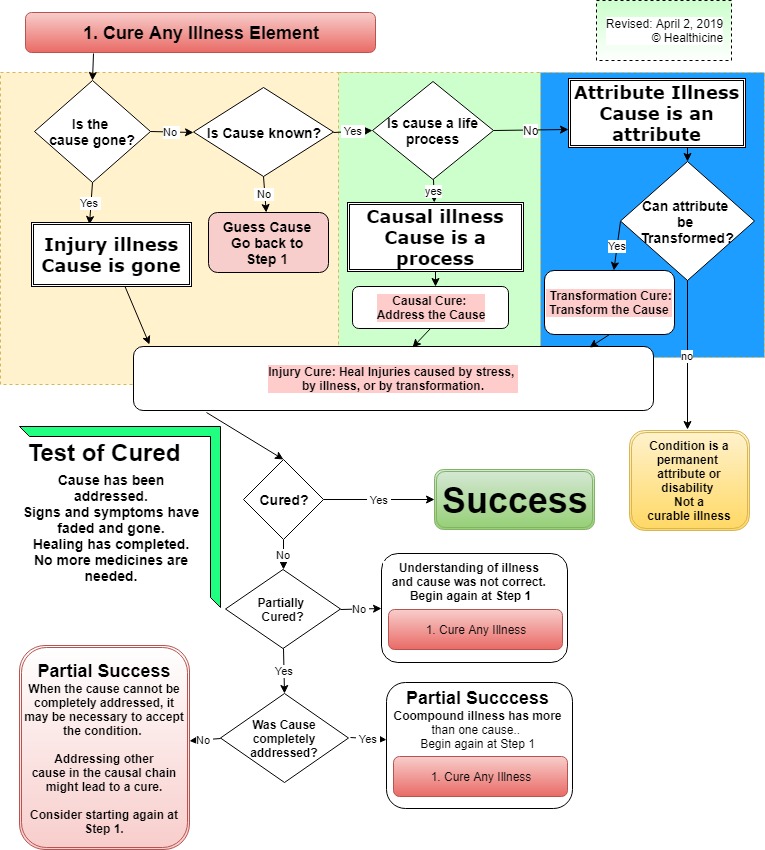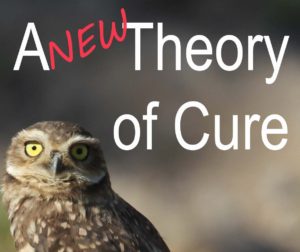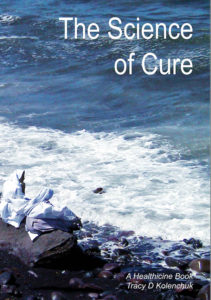Cure: n. A cure is the end of an illness. ( Reference: 1)
Cure: v. A process that brings about the end of an illness. Curing.
An Illness has been Cured when:
- The present cause has been successfully addressed.
- Signs and symptoms of illness have faded and gone.
- Healing of injuries has completed.
- No more medicines are required.
Healing Cure: n. a natural transformation of diet, body, mind, spirit, community, or environment that brings about the end of an illness. Injuries to body, mind, spirit, and communities are illnesses often cured by healing.
Transformational Cure: n. an intentional change to an attribute of patient’s body, mind, spirit, community, or environment that brings about the end of an illness. Transformational cures range from trivial – removing a thorn, to a complex organ transplant. Transformational cures often require healing dependent on the damage caused by the transformation.
Causal cure: v. an intentional change to an ongoing life process of diet, body, mind, spirit, community, or environment that brings about the end of an illness which must be maintained to maintain the cure. Causal cures can range from trivial process changes, dramatic changes requiring significant investment and effort. Malnutrition is cured by a healthy dietary process, not by a meal. Causal cures often cause transformations of body, mind, spirit, or community – and may also require healing.
Illness: n. An illness is a negative condition, consisting of a present cause, which might be in the diet, body, mind, spirit, or community of the patient, and its consequences, the signs and symptoms, which affect the body, the mind, the spirits and the communities of the patient. While an illness is not cured, it can create injuries.
There are three basic types of illness as defined by their cure:
- injury: the illness consists of a hole in the body, mind, spirit or community of the patient. Its cause is in the past and cannot be accessed to cure. The cure is to address the hole, to make it whole. Healing is an ongoing curative process that repairs injuries before, during, and after the illness. (Reference 2, 3, 4). An injury might come from an illness, or from an external event. Healing is seldom perfect. Imperfect healing can lead to a negative attribute, life process changes, or a disability.
- attribute illness: the illness consists of an inability to perform naturally healthy functions (a hole in healthiness) of body, mind, spirit, or community due to a negative physical, mental, spirit, or community attribute. The attribute is transformed to wholeness to cure the illness. Transformation: Removing, and thus curing, negative attributes that reside in the body (physical), the mind (mental), the spirits (spiritual) or the community (communal). (Reference 4) Surgical cures are transformations. Most transformations are less severe: physical changes to body, changes to mental, spiritual, or community states cure illnesses caused by negative attributes. Transformations often create injuries which require healing to complete the cure. A negative attribute that cannot be cured must be accepted, and might be considered a disability.
- causal illness: the illness consists of a hole in the patient’s body, mind, spirit, or community due to an active process. The process must be changed to cure the illness. No single change can cure a causal illness, the curative process must be maintained.
Negative Causes: an illness can be caused by the presence of a cause, or the absence of a cause necessary to healthiness. This applies to all three types of illness; injuries, attribute illnesses and causal illnesses.
Cause of the Cure: When an illness is cured by healing, it was an injury illness. If a process is changed by a one-time, permanent change, an attribute illness was present. When curative process change is ongoing and must be maintained, a causal illness was present. The illness is defined by the cure.
Complex Illness: an illness caused by an illness is a complex illness. A complex illness requires two cures, one for the causal illness and one for the caused illness. Sequencing can be important.
Compound Illness: a compound illness has multiple causes and thus consists of multiple elements of illness, requiring multiple cures, one for each cause. The cure action proves the definition. When an illness is cured by a single action, it was an elementary illness. When a cure requires two actions, one for each cause, it was a compound illness.
CURED: When the present cause of an active illness has been successfully addressed that illness has been cured. If the cause recurs, an new illness might occur.
A partial cure occurs when the cause of an illness is partially addressed, or when a single cause of a compound illness, with multiple causes, is addressed.
A temporary cure occurs when the cause of an illness is temporarily addressed. Temporary cures can lead to chronic illness if a cycle develops.
A chronic illness has a chronic cause.
Attributes exist, and are naturally chronic, therefore many attribute illnesses are naturally chronic. They are cured by changing the attribute – thus changing its chronic nature.
Causal processes are often routines or habits, therefore causal illnesses are often intentionally chronic. Curing a chronic causal illness requires a chronic cure. It requires not only addressing the cause, but also addressing the chronic nature of the cause. Chronic causal cures often requires changing the habits of the patient.
Injury illnesses are not chronic. When an injury appears to be chronic, it is caused by an attribute or process illness.
A disability is an illness we have decided cannot be cured, defined by the decision or belief, unless it is only a temporary disability. It is sometimes converted to a “was a negative attribute” by transformation that cures. A negative attribute can be converted to a disability by giving up in attempts to cure, by accepting it as final.
Preventatives do not cure. All preventative cures are speculative and contain risk. Cures are often preventatives of future illnesses.
== End of Definition ===First published May 24, 2017. Updated October 25, 2020
Current Medical Status of Cure
The word cure, today, is often used for treatments that make no attempt to cure, and cannot cure. Most treatments are symptomicines, cures for symptoms of illness, that do not address any cause, and cannot produce a cure, except by accident.
None of today’s medical theories, sciences, or practices have clear definitions of cure, cures, nor cured which cover all types of cures and all types of illnesses. There is no name for the concept of causal cure, in today’s medicine. It’s actually worse than that.
Many of today’s published medical dictionaries, from Barron’s to Oxford, to Webster’s, simply do not contain the word cure. When they do attempt to define cure, the definitions are weak, simplistic, and often simply wrong. Webster’s online dictionary for learners, for example, defines cure as ‘the act of making someone healthy again after an illness‘.
When we search medical practices, from conventional medicine to Ayurveda, to Chinese Traditional Medicine, to chiropractic, we cannot find a useful definition of cure. Most medical practices simply fail to define ‘cure’ and avoid the word cure in theory and practice. Even homeopathy, which touts the mantra ‘like cures like‘, does not define cure.
When we fail to define cure and cured for any illness, we can fail to find cures. Today, many illnesses are considered incurable, and we have given up attempting to cure – but not given up fundraising for cures. Pity.
This creates several simple problems.
- When cured is not defined, we cannot find cures. How can we search for a cure? How would we know if we found one, or if one occurred by accident?
- When cured is not defined, anyone can claim a cure.
- When cured is not defined, anyone can dismiss or dispute a cure claim.
- When we decide to treat, but not to cure, we create a chronic illness.
Therefore: there are no cures.
If we want to find cures, if we want to know cures, we need to define cures. We can only see a cure, once cured is defined. We can only dispute a cure claim, once cured is defined. Then, and only then, can we seek cures. Today’s medical science is entirely based on measuring signs and symptoms – cures are ignored. There is no accounting, there are no statistics for cures for any disease because cured is not defined. Cure rate, often used in cancer and spreading to use in other diseases is a statistical measure of ‘not sick’, not actually related to cure. We measure “cure rate”, because we have no definition, and thus no way to notice, detect, or prove actual cures for many diseases.
How to CURE any Illness
Once we have a clear definition of cure, for every illness, it is possible to design a process to cure any illness and prove that a cure is present. This diagram is a beginning.
This page provides a simple, clear definition of cure, that can be applied to any illness. This definition was first published in the post: Miracle Cures vs. Healthicine Cures. It has been updated several times for clarity.
I have been researching and writing about health, healthicine, and cures for many years. You can learn more about healthicine’s explorations of cures in these posts:
Searching for Zeno’s Cancer Cure
What is the Cause of your disease?
Miracle Cures vs. Healthicine Cures
The Disappearance of “CURE” from Modern Medicine
Diseases Cured – but not by Medicines
The Alternative Medicine Cures
Is Your Disease Curable? or Incurable? – how to cure any illness.
Cures Rule!
Searching for a Zipless Cure
Are you Too Depressed, or Two Depressed? – curing depression
Mr President: “America Can’t Cure Cancer”
Why Medicine gives up on Cures
Solving the Mysteries of Anecdotal Cures
Cure Ignorance: Myths and Realities about Cures
Healthicines Cure Unhealthiness, Medicines Cure Illness, Symptomicines don’t Cure
Cure: The most Forbidden Word in Modern Medicine
The Strangest Secret in Modern Medicine
What if we found a Cure for Cancer?
Is Diabetes the Easiest Incurable Disease to Cure?
How Cesar Millan Cures Chronic Illness
References:
- Webster’s: Cure: 3. “a complete or permanent solution or remedy.
- Oxford: Cure: 7. “A means of healing”.
- Stedman’s Medical Dictionary: 1. “To heal, to make well“
- Oxford: Cure II 4. “To treat surgically or medically, with the purpose of healing“



